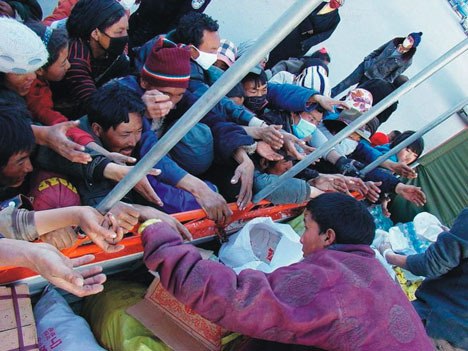Phase Two: 100 yaks.
A local Buddhist group is extending its outreach to victims of last month’s damaging earthquake in Tibet with a campaign to raise money for a herd of the highly valued, high-altitude bovines.
“We want to provide food,” said Diane Berger, managing director of the Kilung Foundation, headquartered on South Whidbey. “We think it will really help to maintain their health and well-being during a difficult time.”
“They won’t be getting anything like this from the government,” Berger added.
The foundation already has raised more than $38,000 in the aftermath of the earthquake to provide emergency aid to surviving residents of the village of Kyeku, which was nearly destroyed.
The number of fatalities in the village hasn’t been determined, but estimates say as many as 3,000 people may have been killed in the entire region by the 7.1 earthquake on April 14.
More than 10,000 people were reported injured.
“The whole town was flattened,” said Berger, who helped to distribute aid in Kyeku immediately after the quake. “More than 90 percent of the buildings came down. It was a field of rubble.”
While aid to villagers is continuing, the foundation is looking ahead. It hopes to provide each of 50 needy families with two yaks, which in turn will supply the families with milk, yogurt, cheese and other dairy products, staples of the Tibetan diet, for the next two years.
The yaks, to be purchased from throughout Tibet, would be grazed on land provided by the Kilung Monastery, located in a nearby province. Milk products would be trucked to the Kyeku families twice a year.
The animals also would be tagged, indicating that they could never be killed for meat, an ancient Tibetan and Buddhist practice of releasing animals from harm, Berger said.
Creating a yak herd also would benefit Kilung nomads by helping to restock a yak population still recovering from a 2008 snowstorm, and by encouraging the traditional Tibetan way of life, she said.
Dairy products from the high grasslands of Dzachuka, where Kilung Monastery is located, are famous for being extra-nutritious, she said.
“It’s very similar to cow’s milk, but the yogurt is really, really rich and the butter is amazingly rich, and not gamey at all,” Berger said. “It’s very lovely.”
She said the yaks of the region benefit from grazing on a dense carpet of herbs that pops up on the plateaus of the region every year.
“It’s like a four-inch forest,” Berger said. “When you walk on them it’s so fragrant it makes you dizzy almost.”
Berger said that each yak costs $440, but that donors are urged to contribute any amount, large or small. Sponsors are needed by May 30, Berger said, to purchase the yaks before the summer milking season.
Kilung Monastery is the home of Kilung Rinpoche, a Buddhist monk who is the namesake of the Kilung Foundation. Since 1998, Kilung Rinpoche has spent time in the Seattle area, conducting classes, programs and meditations and raising funds for Tibetan humanitarian causes.
Three years ago, he and Berger moved their headquarters to five acres on South Whidbey, where they conduct meditations, retreats and other programs. Kilung Rinpoche now splits his time between the monastery and Clinton, Berger said.
Kilung Rinpoche is considered the fifth reincarnation of H.H. Jigme Ngotsar Gyatso, a yogi who built Kilung Monastery in the 18th century.
Kilung Rinpoche, also known as Kyabje Jigme Tendzin Chodrak, is the head of the monastery, and has been working to reestablish it as a center of learning and practice since he was a teenager.
Berger said response to the foundation’s call to help the earthquake victims has flowed in from throughout the world.
“It’s just been phenomenal,” she said.
“There’s been a lot of joy in this,” she added, “a terrible tragedy, but a joy of accomplishment.”
To sponsor all or part of a yak, send a check to Kilung Foundation, PO Box 622, Langley, WA 98260, or visit www.kilung.org. For more information, e-mail tibet@kilung.org or call 341-4184.



